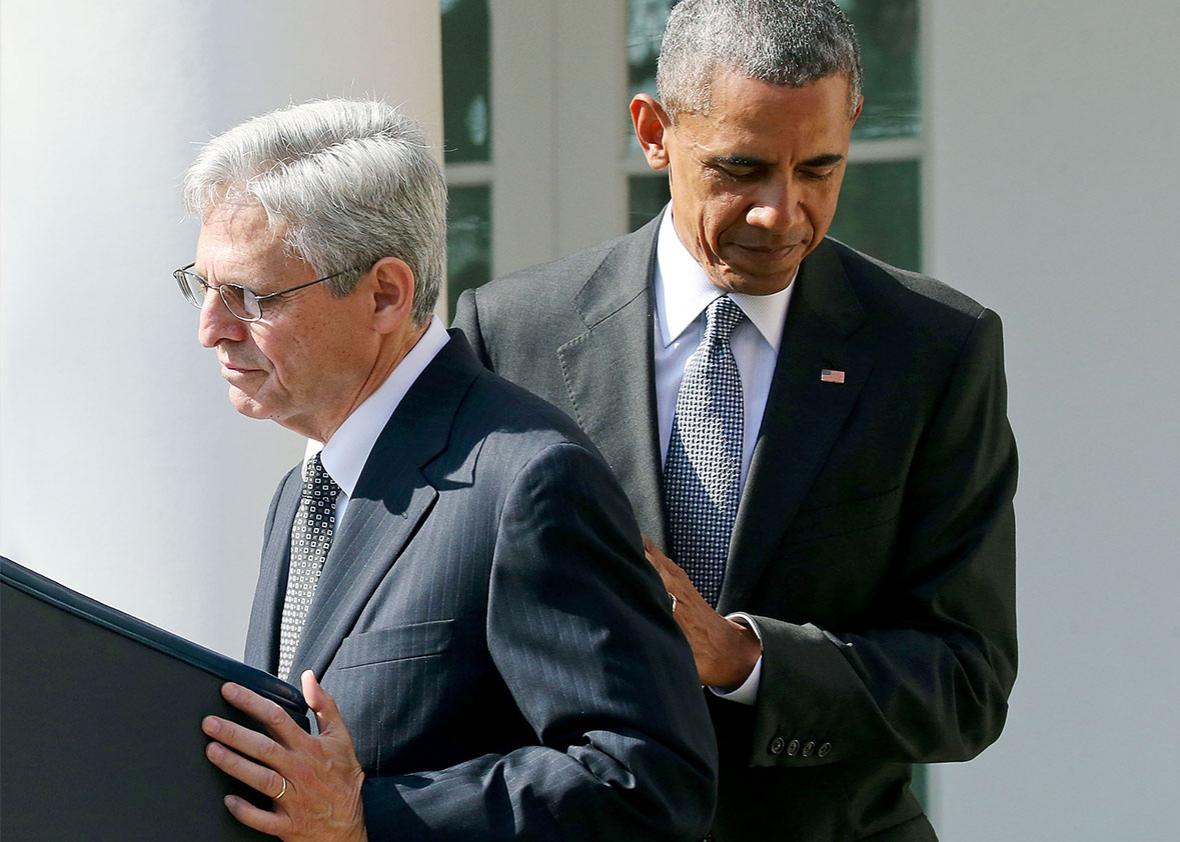Merrick Garland, the appellate chief judge whom President Obama has nominated to the Supreme Court, is not going to become a Supreme Court justice before the election or probably ever. One imagines that both he and Obama are aware of this. He is a prop, chosen to spend the next eight months as a prop.
The proof is in the basic description: Garland is a 63-year-old white man with a centrist inclination. If Obama were selecting a Supreme Court justice whom he genuinely expected to be confirmed, Garland’s nomination would constitute political malpractice. He is too old, too unreliable, too much a creature of the statist center, and he brings no diversity to the bench. No offense to him, of course. But he knows this, and he knows that his nomination exists largely as a political lever against Republicans. He is someone about whom Senate Republicans have said nice things in the past, and his selection allows Democrats to wield those statements against Republicans as evidence of hypocrisy. Obama “could easily name Merrick Garland, who is a fine man,” Sen. Orrin Hatch said in a recent Newsmax interview, to give just one example. “He probably won’t do that because this appointment is about the election. So I’m pretty sure he’ll name someone the [liberal Democratic base] wants.” It will be genuinely amusing for the remainder of the year to watch Hatch defend himself against this and other quotes as he refuses to consider Garland’s nomination.
Hatch had a point about how Garland is not, however, a great pick to rally the liberal Democratic base. This points to the quandary Obama was facing in selecting his prop nominee: Should he pick a boring centrist whom Republicans would tie themselves into knots trying to portray as unacceptably left-wing or a younger, nonwhite, perhaps female rising star around whom the Democratic base could rally? He chose the former. Though Garland’s selection may make Republicans look especially foolish in their obstructionism, Democratic interest groups won’t be all that exercised by Republican obstruction in this instance. The National Organization for Women, for example, released one of the first statements following Garland’s nomination. It referred to Garland a “real nowhere man” on issues of women’s rights.
What Garland does—and he should be commended for doing it—is take the bullet for whichever candidates-in-waiting Democrats really hope to get on the Supreme Court one day, whether that’s Sri Srinivasan, Paul Watford, Jane Kelly, or whoever. Had any of those candidates been nominated, Republicans would have deemed them radically liberal from the start and drawn the bad-faith argument backward from there, just as they’re going to attempt with Garland now. Their names would have been shot by the time would-be President Hillary Clinton got to make a nomination for real. (Clinton could, of course, re-nominate Garland in 2017, but she would likely want her own pick—and Republicans will have made Garland toxic to themselves by then.) We can reasonably ascertain that those nominees-in-waiting are privately thankful not to have been selected.
If Garland is mostly a player in Obama’s rope-a-dope strategy, though, that itself represents an interesting shift in Obama’s thinking from his first term to his second.
Garland was not always considered as a prop. In 2010, following Justice John Paul Stevens’ retirement, Garland was on Obama’s shortlist for the position that ultimately went to Justice Elena Kagan. Neither Garland nor Kagan was a candidate about whom liberals were all too thrilled. They were products of the Obama administration’s first-term, reach-across-the-aisle thinking that liberals considered excruciatingly naïve. Obama would go out of his way making overtures to Republicans for a bipartisan consensus that was never coming. Kagan and Garland were perfect manifestations of that.
Six years later, Obama has been disabused of those instincts. We don’t want to get too cynical: Obama surely believes that Garland is a good man and a perfectly qualified judge who by any measure would constitute a stark improvement over Justice Antonin Scalia; the president and his nominee seem to share certain heterodoxies from the left on matters related to civil liberties. But Obama is not so ungrounded as to believe that Garland will end up in Scalia’s chair or that Republicans will see the light and confirm him before his tenure ends. A centrist like Garland was someone that first-term Obama thought might earn Republicans’ respect. Now he is someone that second-term Obama knows will earn their irrational enmity.
Read more on Obama’s nomination of Merrick Garland to the Supreme Court.
